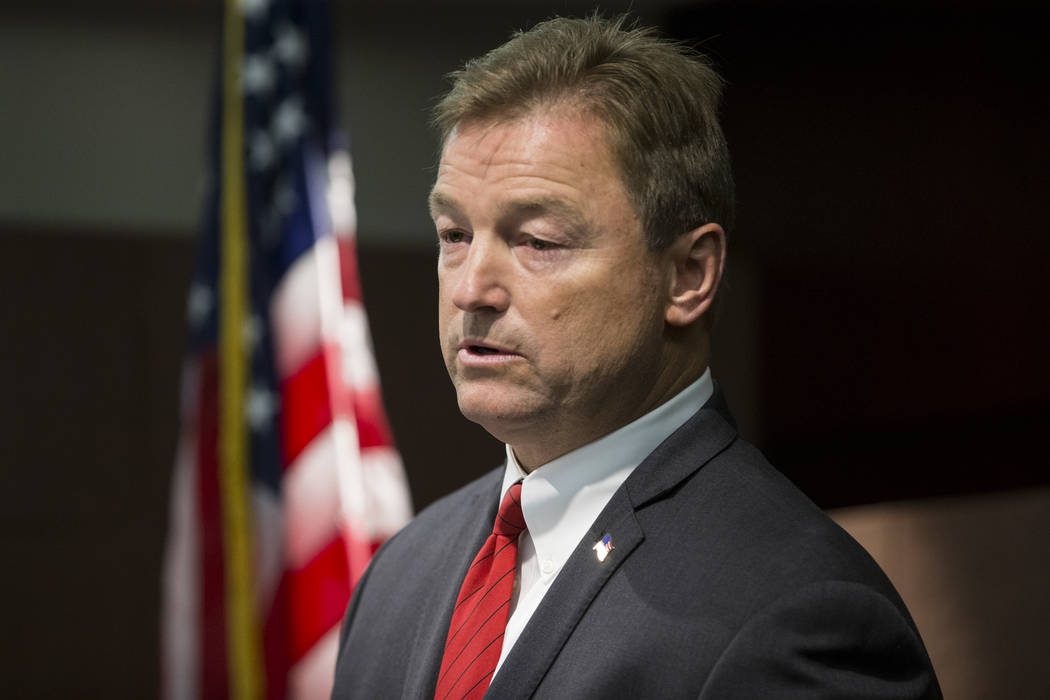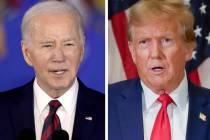Heller, a consistent foe of Obamacare, faces critical vote
WASHINGTON — Just one week after his appointment by Nevada Gov. Brian Sandoval to fill a vacant Senate seat, Dean Heller said it had become clear the Obamacare law was “flawed.”
Heller voted against the Affordable Care Act in 2010 while serving in the House, and in one of his first news releases as a senator, he said it was “clear that the unique health care needs of individual states were not taken into consideration.”
“This is why Obamacare will not work for Nevada,” Heller said.
For the next seven years, Heller voted to repeal the ACA.
But now all eyes are on Heller as Senate Republicans leaders, prodded by President Donald Trump, push for a vote this week on either a repeal of Obamacare, or repeal and replacement with a quickly crafted plan that has been cobbled together by senators behind closed doors.
A group of moderate senators, including Susan Collins of Maine, Shelley Moore Capito of West Virginia and Lisa Murkowski of Alaska, oppose a procedural vote to bring a repeal-only bill to the floor.
“I don’t think it’s constructive to repeal a law that is so interwoven within our health care system without having a replacement plan in place,” Collins said.
And Heller was part of a group of moderate senators who opposed a previous version of a Senate GOP replacement plan because it cut $756 billion from Medicaid and rolled back an expansion that cut the rate of uninsured residents in half in Nevada and resulted in coverage for an additional 200,000 Nevadans.
Critical of first draft
During a Las Vegas news conference with Sandoval, a Republican, Heller was an outspoken critic of the GOP plan, saying he could not support the first draft because it would leave many in the state without insurance and shift costs to provide coverage to the state.
“I simply will not support it,” Heller told the news conference.
But Heller has left the door open to accept a plan that repeals Obamacare and replaces it with a program that “is best for Nevada.” Only Heller knows what that barrier is.
“I am all for Obamacare repeal. I believe if we let this thing go for another five years and make no changes, the thing is going to cave in on itself anyway,” Heller told the Review-Journal in a June interview.
“But the question is how do we do it and set it up so that it doesn’t cave in, and make sure we take care of people that have over the last five to seven years now have health care that they otherwise would not,” he said.
Since then, Heller has been targeted by a pro-Trump political action committee that launched a $1 million ad buy attacking his conservative bona fides before taking down the ads.
The conservative group FreedomWorks noted Heller’s 2015 vote to repeal Obamacare and cited him as one of the GOP senators who have “waffled” now that President Barack Obama is not there with a veto pen.
Trump last week issued a veiled threat that Heller should get on board, if he wants to keep his senate seat.
Heat from the left
Heller also faces heat on the left.
A potential opponent in 2018, Rep. Jacky Rosen, D-Nev., has attacked his noncommittal stance, saying thousands of Nevadans worry about the state of their health care.
Liberal-leaning groups are also attacking him in advertisements.
“He’s in a tricky spot,” said Kyle Kondik, a political scientist with the University of Virginia’s Center for Politics. “He is definitely walking a tightrope here.”
Heller is considered the most vulnerable Republican in the Senate up for re-election in 2018.
The Center for Politics currently rates the race as “leans Republican,” but Kondik said he expects it to move to “toss-up” now that Rosen has jumped into the race.
Rep. Dina Titus, D-Nev., also is weighing a possible race.
If Heller should draw a primary GOP opponent and lose, the race likely would tip even further for Democrats, Kondik said.
Heller is running in a swing state that Hillary Clinton won in 2016 by a narrow margin. The Democratic organization also helped Sen. Catherine Cortez Masto defeat then-Rep. Joe Heck, R-Nev., in a close race.
Heller is going to be “squeezed, one way or another” as he tries to navigate choppy political waters.
“He could get moderates but lose enthusiasts,” Kondik said. “And there are going to be things that are out of his control. The president is unpopular. It may not matter how Heller votes if the environment is bad.”
Senate leaders scrambling
Meanwhile, it’s unknown what the Senate will vote on this week as leaders scramble to revive a GOP replacement plan that can bring conservative and centrists together on a bill that can pass.
A new Congressional Budget Office analysis shows that the GOP plan would push 22 million more people into the ranks of the uninsured. A straight repeal bill would leave 32 million without coverage by 2026 while reducing the federal deficit by $473 billion.
Republicans hold a slim 52-48 majority. GOP leaders can afford to lose only two votes, with Vice President Mike Pence as a tiebreaker.
A vote also could hinge on Sen. John McCain, R-Ariz., who has been diagnosed with a brain tumor but is expected back in Washington soon.
To win votes from centrists such as Heller, GOP leaders are offering to put in $200 billion for states that expanded Medicaid, as Nevada did, to help buffer cuts to the program.
“While $200 billion seems like a lot of money, it’s only 17 percent of the bill’s $1.2 trillion in cuts,” said Judy Solomon of the left-leaning Center for Budget and Policy Priorities.
It also would be spread among the 31 states and the District of Columbia that expanded Medicaid under Obamacare.
But as senators fled Washington last week, no firm replacement plan had been forged, and lawmakers were still uncertain what they would be voting on when they returned.
Still, Heller said conversations were continuing and, “I remain committed to working on behalf of Nevadans.”
Contact Gary Martin at 202-662-7390 or gmartin@reviewjournal.com. Follow @garymartindc on Twitter.
Sen. Dean Heller: key health care votes
As a member of first the House and now the Senate, Dean Heller cast four votes against the Affordable Care Act or a related measure and five votes to repeal it.
Yes for repeal
Jan. 12, 2017: A Senate budget resolution to begin the process of repealing the ACA. Bill passed. ; Heller voted yes.
Dec. 3, 2015: Senate measure to repeal portions of the ACA. Bill passed. Heller voted yes.
July 26, 2015: Senate amendment to repeal the ACA. Motion failed. ; Heller voted yes.
May 3, 2011: House resolution repealing funding provided to states to establish American Health Benefit Exchanges. Bill passed. ; Heller voted yes.
Jan. 19, 2011: House resolution to repeal the Affordable Care Act. Bill passed. Heller voted yes.
No for the ACA
March 21, 2010: House resolution amending the ACA. Bill passed. ; Heller voted no.
March 21, 2010: House resolution approving the ACA. Bill passed. ; Heller voted no.
Nov. 7, 2009: House resolution on an early version of health reform legislation, the Affordable Health Care for America Act. Bill passed. ; Heller voted no.
Jan. 14, 2009: House resolution to extend and improve the Children's Health Insurance Program, and for other purposes. Bill passed. ; Heller voted no.
SOURCES: healthreformvotes.org; Project Vote Smart; FreedomWorks




























